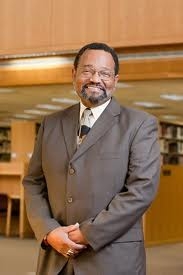
Tendaji Ganges
Tendaji Ganges's high school counselor was convinced he was not college material.
"She didn't even see me," says Tendaji, Director of Educational Opportunity Initiatives at U-M Flint.
Tendaji, who was born with the name Henry, grew up in Trenton, New Jersey, the oldest of three boys. His mother took in typing, and his father was a wireman at RCA. His father died at age 52. His mother passed away ten years later.
Tendaji was an unremarkable student at Trenton High School. Then, in tenth grade, Upward Bound, a federally funded program designed to identify students with potential from low-income families found him, like a diamond in the ruff.
He was about 15 years old, he says, when "folks came down from Princeton University to recruit 'bright' students."
"The story that I learned later was that they had room for nine slots, and they were about to leave and the director of the program said, 'You know what? You're sending us your absolutely best and brightest kids. But we really need a bright kid who's a challenge, who hasn't quite caught fire yet.' That was me."
"Upward Bound, for a lot of us, was the first time anyone had talked to us seriously, or had any kind of confidence or faith that we might be college material. It wasn't about not letting them down. It was about being able to take advantage of the opportunity."
An Education and an Advancement
Tendaji went on to get his B.A. from Antioch College (in Education), and his Master's from what is now Kean University (in Student Personnel Services and Counseling). While in school, he worked for Upward Bound as a counselor, and moved up the ranks until he became Assistant Director.
Once he completed school, he left the program, and spent several years carving a niche for himself in educational opportunity programs on college campuses in Indiana and Illinois. The name "Tendaji," a Swahili word meaning "hard working," was given to him as a gesture of honor and affection by a group he worked with in Chicago.
While working in Illinois, Tendaji's old friend, Charlie Nelms, called to say that he had taken a job as the Chancellor at U-M Flint, and wanted Tendaji to apply for a new position focused on student outreach. Tendaji says his initial reaction was," 'Flint, Michigan? I'm in Chicago, man!' "But he is the reason I came."
Since then, Tendaji has been creating programs and raising funds so that U-M Flint can continue preparing young (and old) people in the community for college, as well as getting them through college. His office provides a number of full-tuition scholarships for students who complete one of U-M Flint's pre-college programs. "Next year there will be close to 45 students who will be ready to go in the pipeline, because that program has grown," he says.
Tendaji describes Flint as a city afflicted by blue collar lay-offs. "We have a lot of people who have worked for twenty or thirty years, and all of a sudden they're without a way to make a livingWe intervene with those individuals-not financially, but academically- to help them make the transition and be successful."
Tendaji says the University of Michigan-Flint is a very different institution than the Ann Arbor campus.
"[U-M Flint] is not a research institution. It is intended to be a teaching institution. So we have a couple of doctoral programs but they are very, very new. [Students] are more interested in pragmatic things, practitioner programs, like social work, nursing, teaching. These are folks looking for careers as opposed to a liberal arts education that will prepare them for the pursuit of a career."
In a town where higher education is not the norm, he says, there are a lot of students who are ill-prepared for the kind of challenges they face as university students.
"These are not Ann Arbor students," Tendaji says. They didn't have parents who could read their school papers and offer assistance.
"Let's be honest. This was a shop town. You went to school because the law said you had to go to school. You got basic skills, but basically you were going to go to work in the shop, and you were going to make a very good living. At one time, the per capita income in Flint was among the highest in the country. So 'why go to college?'"
Tendaji's passionate intensity fires up the students and parents he meets. He is a gentleman, if not by the obsolete definition, certainly by his generosity, bearing and accomplishments. He gives students opportunities, as he was given once, a long time ago, and finds great satisfaction when he sees them engage, adapt and flourish. His work is not done.
"My high school counselor judged me to not be college material. The Upward Bound program came through and presumed that we were going to college. That made all the difference," he says.
- Jan Schlain